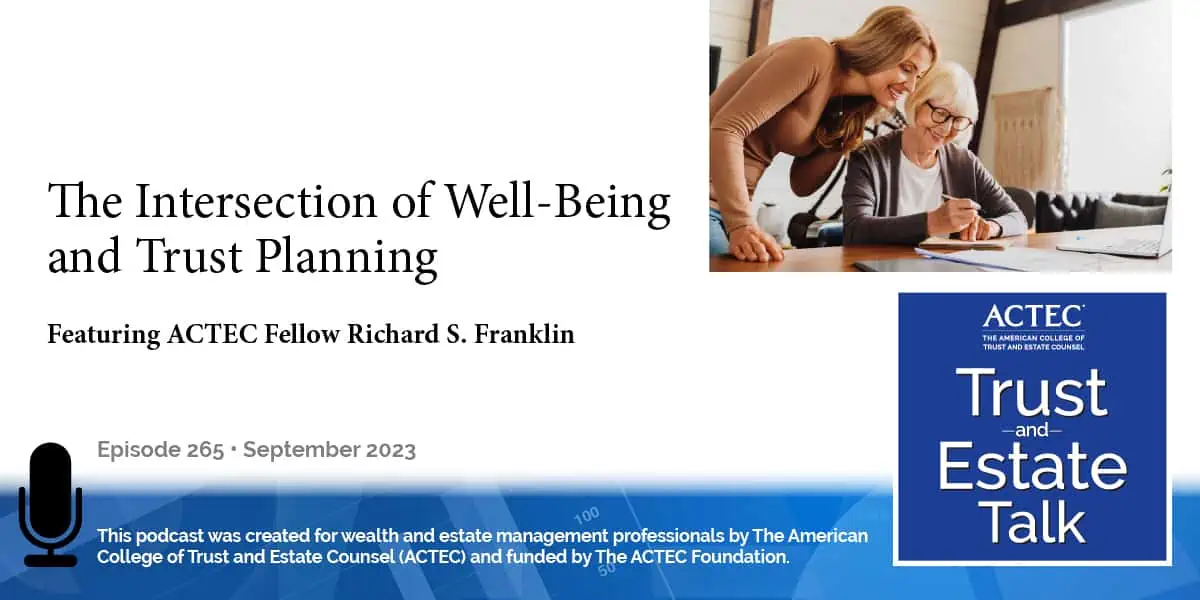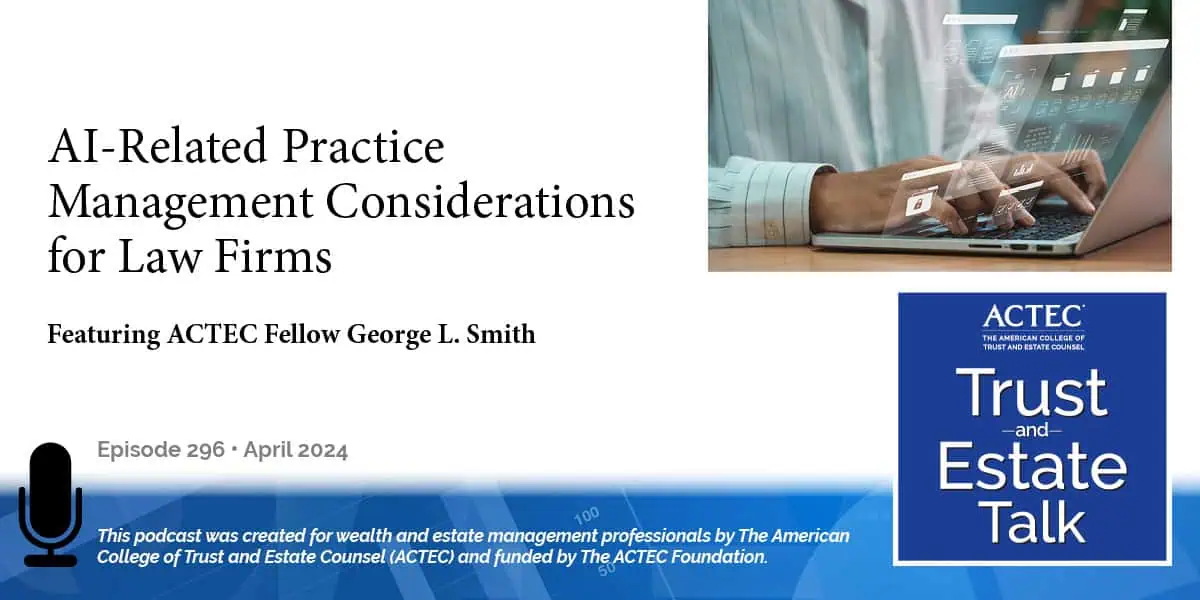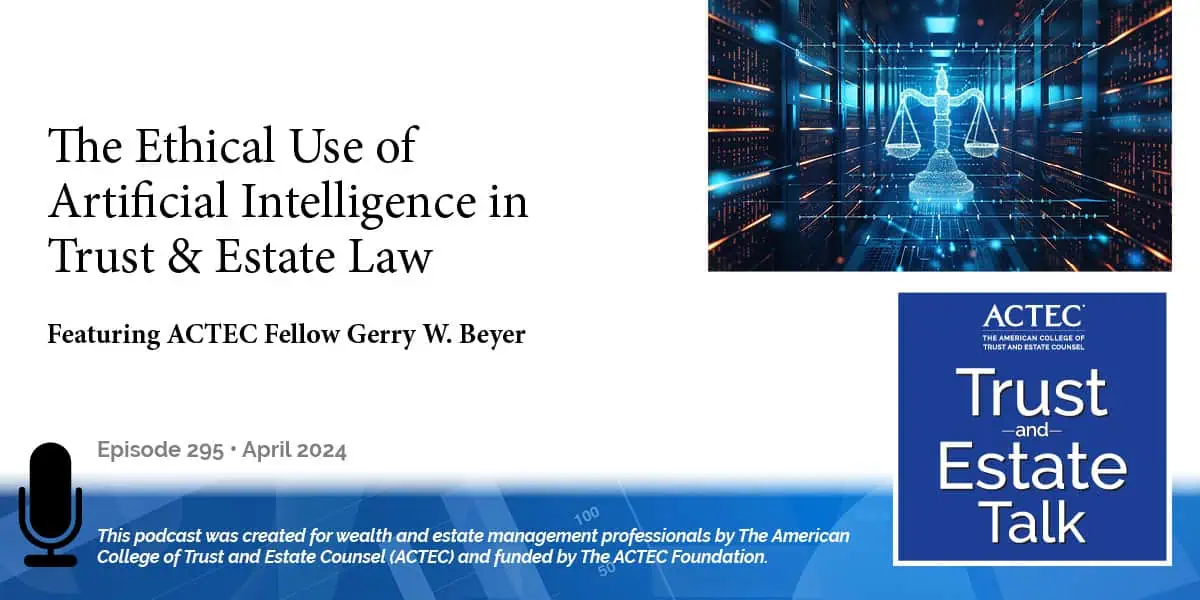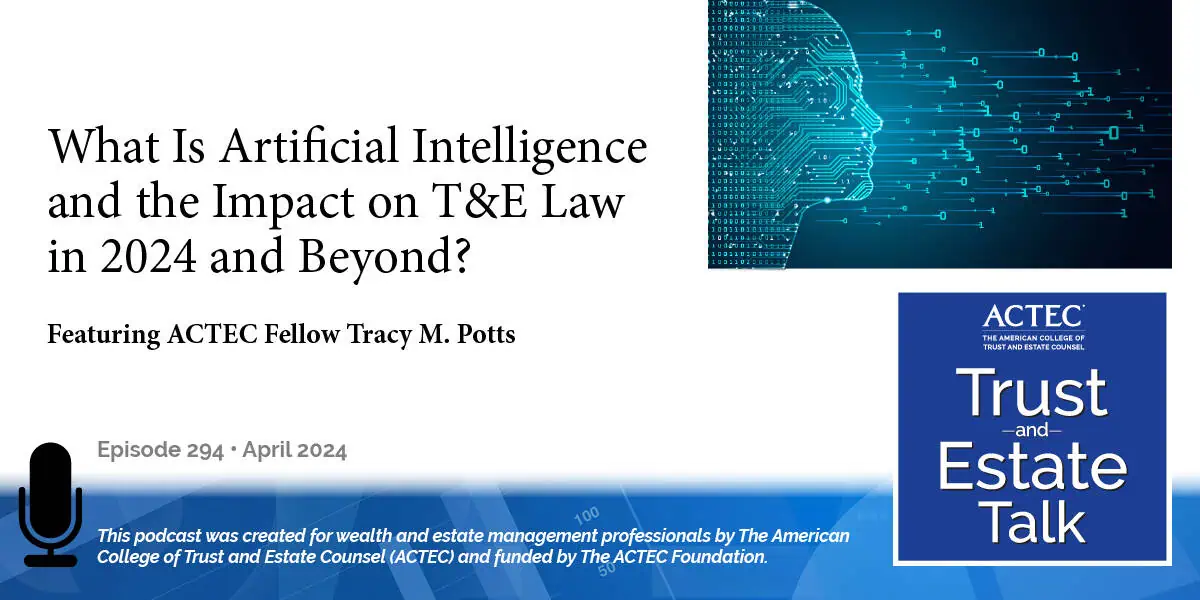The Intersection of Well-Being and Trust Planning

“The Intersection of Well-Being and Trust Planning,” that’s the subject of today’s ACTEC Trust and Estate Talk.
Transcript/Show Notes
This is Travis Hayes, ACTEC Fellow from Naples, Florida. Many individuals and families are finding ways to deliberately and intentionally increase their happiness by creating more positive emotions, improving their relationships, and finding more meaning in accomplishing more in their lives. Some practitioners are beginning to introduce Well-Being theory into their clients’ estate planning by engaging them in a collaborative journey towards flourishing, with each member of the family maximizing his or her potential and living a purposeful life.
One way for practitioners to accomplish this is to consider the use of Well-Being trusts and incorporate Well-Being provisions into the drafting process. ACTEC Fellow Richard Franklin of Washington, DC, joins us today to discuss this topic. Welcome, Richard.
Introduction to Well-Being Theory
Thank you. The research and data from positive psychology and Well-Being science should be used to inform trust and estate planning for the betterment of clients and their beneficiaries. These data sets are robust sources of information, the real hard data, so to speak. In particular, I’ve been explaining how these bodies of research could help trust and estate professionals in three ways:
- First, to address client concerns over inheritance, such as the idea that family, businesses, and wealth are lost in three generations or that happiness peaks at $75,000.00 of income; both of which I believe are myths, based on the research.
- These bodies of research could inform estate planning design recommendations, such as moving more towards a lifetime approach to inheritance; which I believe the research indicates would improve Well-Being.
- And the third way is, just citing this research in the estate planning documents we prepare for clients could make the work of the trust and estate professionals more transformative.
Well-Being Trusts and Education Investing
Today, I will focus on this last point. The research supports the idea of investing in the education of others, including traditional higher education programs, technical and vocational programs, and other forms of educational achievement. Now, most people understand the importance of education without turning to research. This is demonstrated, for example, in the immigrant stories of our ancestors that came to the United States and worked hard, frequently under harsh circumstances, and sacrificed to enable their children to receive an education, essentially, all based on the idea that education would be a path to a better life.
Many of us have our own personal stories of how education has contributed positively to our lives. The research, however, also supports the common idea. Education is correlated with better career, social, physical, financial, and community Well-Being, and that refers to the Gallup model of Well-Being.
Health, Physical, Social and Vocational Benefits of Education
In the physical domain, educated people have less heart disease, less risk for dementia, longer life expectancy, and longer disability-free life expectancy, just to name a few. In the career and financial domains, educated people have better careers and higher income, and with higher income, people have better Well-Being with no satiation point. Those with a bachelor’s degree are twice as likely to call their job a career than those with only a high school diploma. The latter views work just as something to get by.
This divide speaks to the benefits of higher education in the workplace beyond just salary. In the community domain, voting and participating in the community are all correlated with higher education. In the relationship domain, education is correlated with being a better marriage candidate and friend. Of course, the pursuit of traditional higher education is not the path for everyone and the research shows that pursuing technical and vocational education and training have Well-Being benefits, too, including improvements in confidence, self-esteem, and work-life satisfaction.
Research shows that technical and vocational education brings improved societal equity. An education trust is one vehicle frequently used by parents and grandparents to facilitate that investment. In recognition of this, we could update the language used in our education trust to better articulate the critical role of education in Well-Being. Briefly setting forth this research in the trust instrument helps to demonstrate the robust connection of education to Well-Being.
Education Trust and Well-Being Trusts Compared
The trust creator’s positive intentionality in creating the trust is amplified by understanding the correlations of education and Well-Being improvement. The research also serves to explain the trust creator’s goal in establishing and funding the trust.
Now, one might surmise that the trust’s purpose is to finance education with all its benefits, including how it may improve life circumstances. The picture is more crisply drawn, however, by having the trust language state the Well-Being benefits of education as set forth in the research. It focuses attention on the ultimate goal that the trust beneficiary have access to education because education helps create the circumstances for the beneficiary to feel more satisfied with their life.
Updating your education trust language in this way helps the trust creator, the trustee, the beneficiary, the investment advisor, the trust protector, the accountant, and the lawyer all be more goal-oriented — that the trust beneficiary be more satisfied with their life. Of course, the basics of qualifying contributions for the annual gift tax exclusion, protecting the trust assets from creditors, and investing prudently, are still addressed by the education trust, but all of this is done with a more refined awareness that this trust has the potential to improve the beneficiary’s life. In this sense, the trust creator’s efforts, as well as the efforts of all the other professionals involved, are more transformative and meaningful.
Education, in the abstract, is not the focus of everyone’s effort. Rather, it’s helping to improve someone’s life. By incorporating the research into our education trust planning, we’re more likely to accomplish that goal than flying blindly or just basing the approach on anecdotal evidence. It just makes sense; education trust and the research supporting it go together.
The idea of Well-Being trusts is not a radical approach. A Well-Being trust follows the research from positive psychology and Well-Being science about what is more likely to improve Well-Being and help the beneficiary feel more satisfied with their life, essentially, to get the most out of what makes life worth living. Education, as noted, does that in all the domains. Therefore, you, as trust and estate professionals, are already creating Well-Being trusts when you help clients create education trusts.
Everything done or not done has an impact on wellbeing. Not being intentional about it just means the lawyer, the client, and the parent are all less likely to know whether the impact of their efforts is negative, neutral, or positive. So, yes, the import of what I’m suggesting is that all trust and estate professionals need to learn about Well-Being science, just as they’ve learned about tax planning. Both are to the client’s benefit. After all, what’s the point of all the tax planning if the wealth is passing to trusts that are poorly structured, based on the science for the humans involved?
Thank you, Richard, for discussing the incorporation of Well-Being science into our estate and trust planning practices and how it can benefit our clients and their families and improve their lives.
You may also be interested in:
Latest ACTEC Trust and Estate Talk Podcasts

AI-Related Practice Management Considerations for Law Firms
A discussion for law firms about how to incorporate AI in their practice management, including staff considerations, the “billable hour,” and more.

The Ethical Use of Artificial Intelligence in Trust & Estate Law
A law professor offers insights into the risks, rewards, duties and ethical considerations of lawyers using AI in their T&E practices.

What Is Artificial Intelligence and the Impact on T&E Law in 2024 and Beyond?
A primer on the types and uses of AI, then a deeper dive into the impact on trust and estate law from types to applications to ethical considerations.

